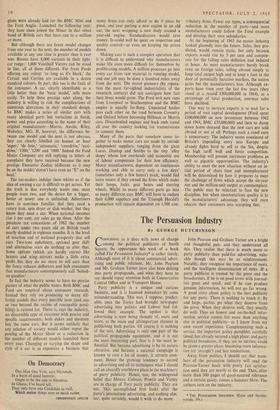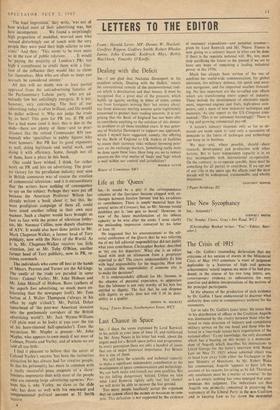The Persuasion Industry
By GEORGE HUTCHINSON
COINCIDING as it does with news of change among the political publicists of Smith Square, the appearance this week of a book called The Persuasion Industry* is rather timely. Although most of it is about commercial adver- tising and public relations, Mr. John Pearson and Mr. Graham Turner have also been delving into party propaganda, and what they have to say should repay attention both in Conservative Central Office and in Transport House.
Party publicity is a unique and curious business, and it is haunted nowadays by some misunderstanding. This was, I suppose, predict- able, once the Tories had 'brought newspaper advertising into politics and Labour had fol- lowed their example. The upshot is that advertising is now being thought of, more and more, as the main and all-important element in publicising both parties. Of course it is nothing of the sort. Advertising is only one part of the political propaganda equipment, and it is not the most interesting part. Nor is it the most in-' fluential. But because advertising is by its nature obtrusive, and because a national campaign is known to cost a lot of money, it attracts com- ment. Hence the growing tendency to accord to advertising and all its techniques what I should call an absurdly overblown place in the machinery of party publicity. Hence, too, the widespread belief that Messrs. Colman, Prentis and Varley are in charge of Tory party publicity. They are not. This accomplished firm looks after the party's intermittent advertising, and nothing else; nor, quite certainly, would it with to do more. John Pearson and Graham Turner are a bright and thoughtful pair, and they understand all this. They realise that there is much more to party publicity than paid-for advertising, valu- able though this may be as reinforcement. Notably, they recognise the importance of news, and the intelligent dissemination of news. If a party publicist is trusted by the press and the broadcasters, if he is on good terms with journal- ists great and small, and if he can produce genuine information, he will not go far wrong. A good story about policy is the best publicity for any party. There is nothing to touch it. By and large, parties get what they deserve from the press. When they deserve well, they usually do well. Thus an honest and on-the-ball infor- mation service counts for more than anything else in political publicity—as I know from my own recent experience. Complementing such a service, the important policy pamphlet, carefully timed, has already secured a high place; and party political broadcasts, if they are to survive, could be given a greater place, becoming more informa- tive (or 'straight') and less tendentious.
Away from politics, I should say that mem- bers of the persuasion industry will read the Pearson-Turner book with pretty fair satisfac- tion until they are nearly at the end. Then, after more than 300 pages of good-natured tolerance and a certain gaiety, comes a hammer blow. The authors turn on the industry.
* THE. PERSUASION INDUSTRY. (Eyre and Spottis- woode, 30s.) 'The final impression,' they write, 'was not of how wicked most of their advertising was, but bow incompetent. . . . We found a surprisingly high proportion of muddled, worried men who seemed disturbingly out of touch with the very people they were paid their high salaries to con- vince.' And then: 'This seems to be even more so in the case of public relations.. . . It would be paying the majority of London's PRs too high a compliment to credit them with a frac- tion of the influence they would like to claim for themselves. Men who are often so inept can scarcely be considered sinister.'
All this will no doubt win at least partial approval from the anti-advertising fanatics of the Parliamentary Labour party, who are ad- mittedly few but unfailingly energetic. It is not, however, very convincing. The best of our advertising today is often brilliant, and life would be duller without it. Why not judge the trade by its best? This goes for PR too. If PR still has a bad name (and it has), this is due to the duds—there are plenty of them—and to prac- titioners like the retired Commander RN (un- named) who 'specialises in public figures who want honours.' But PR has its good exponents as well, doing legitimate and useful work, and doing it with efficiency. Some, though not all of them, have a place in this book.
One could have wished, I think, for rather mote on PR and less on advertising. The great- est Victory for the persdasion industry ever seen in British commerce was of course the creation of commercial television : and it is extraordinary that the writers have nothing of consequence to say on the subject. Perhaps they were put off because the American Professor Wilson has already written a book about it; but this, the ' most prodigious campaign of them all, could have stood another telling in their own easy manner. Such a chapter would have brought us face to face with the prince of television lobby- ists, Mr. Norman Collins, now deputy chairman of ATV. It would also have done justice to Mr. Mark Chapman-Walker, a former head of Tory publicity, now with the News of the World. As it is, Mr. Chapman-Walker receives too little attention, just as Mr. Toby O'Brien, another former head of Tory publicity, now in PR, re- ceives overmuch.
The individuals who come off best at the hands of Messrs. Pearson and Turner are the Ad-kings. The swells' of the trade are paraded in some force: Colonel Varley; Mr. John Hobson and Mr. John Metcalf of Hobson, Bates (authors of the superb Sun advertising, so much more ex- hilarating than the newspaper itself); Mr. Tom Sutton of J. Walter Thompson ('always in his office by eight o'clock'); Mr., Patrick Dolan (spearhead of 'the post-war American invasion into the gentlemanly corridors of the British advertising world'); Mr. Jack Wynne-Williams ('all plain mail as he looks at you over the top of his horn-rimmed half-spectacles'). Even the mysterious Mr. Maples is present—Mr. John Maples, who appears to own much if not most of Colman, Prentis and Varley, and of whom we are told all too little.
I find it pleasant to believe that the secret of Colonel Varley's success 'has been the instinctive attraction he has always had for creative people. In this his personality has more in common with a really successful press magnate or a show- business impresario than with most of the people who are running large advertising agencies.' Per- haps this is why Varley, no slave to the slide rule, has done so well with his renowned and temperamental political account at 32 Smith Square.











































 Previous page
Previous page